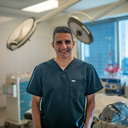Because of a number of techniques I use during breast augmentation surgery that are outlined below, I see very few capsular contractures in my breast augmentation patients. However, the reality is that if you are a breast augmentation patient with a capsular contracture, the incidence - at least to you - feels like 100%. A well-established capsular contracture can be corrected, but doing so involves a return to the operating room, removing and discarding the implant, removing or excluding the contracted capsule, creating a completely new implant space, and putting in a new breast implant (that statement may be somewhat controversial, but I believe the procedure just described is what is what provides a patient with the lowest risk of recurrent contracture). So I think that surgeons should feel obliged to do everything possible to limit the likelihood that a patient develops this frustrating postoperative problem.












